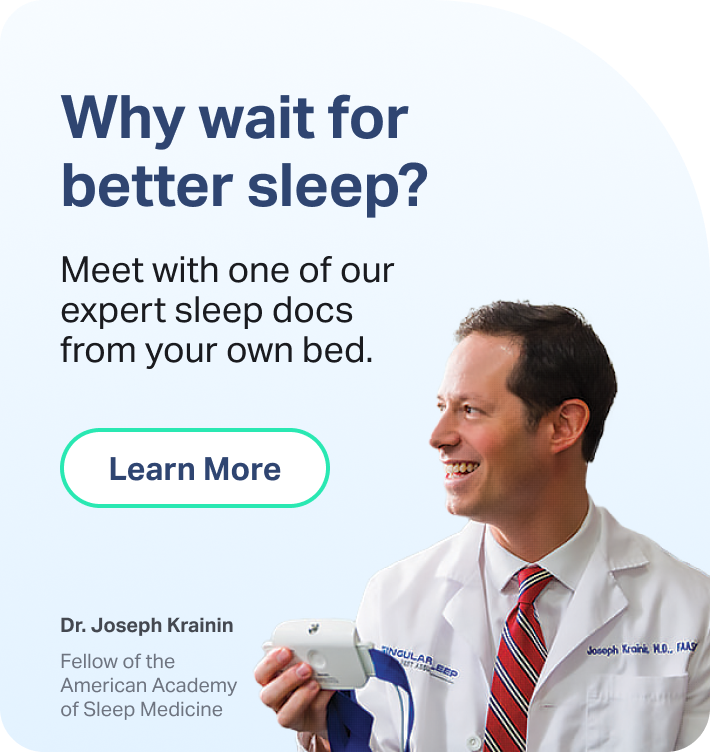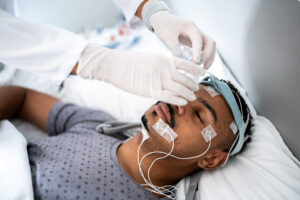When you buy through our links, we may earn a commission. Products or services may be offered by an affiliated entity. Learn more.
How to Find a Sleep Doctor Near You
Struggling with a sleep disorder is more common than you might think, and identifying and treating such disorders are very important. Sleep disorders, while common, are often not diagnosed as frequently as other health issues.
If you feel like you’re struggling with a sleeping disorder or disrupted sleep, your primary care doctor may suggest a trip to a sleep specialist or sleep center. Sleep centers use testing to monitor your body while you sleep, which helps your sleep specialist get enough information about your symptoms to make a diagnosis.
How to Locate Sleep Specialists Near You
Locating a sleep specialist near you might seem like a daunting task, but multiple options exist to help you successfully find and book a sleep specialist.
Find a Sleep ConsultantMeet With Your Current Primary Care Doctor
Talking to your doctor about your health can be challenging, but it is worthwhile if doing so helps you get adequate rest each night and improve your overall health. Before you meet with your primary care doctor, make a list of any times you’ve tried to adjust or reset your sleep routine and been unsuccessful. Examples of relevant adjustments include:
- Changing bedtime
- Changes to diet
- Exercising more or less
- Getting new mattresses or pillows
- Changes to sleep hygiene, such as blocking out light or sound
After you share your concerns, your doctor might recommend a sleep study to help diagnose your sleeping issues.
Contact Your Insurance Provider
If your doctor determines you should see a sleep specialist, they may have referrals they recommend. However, you may have to do your own searching for a specialist. If you need to find a specialist, your first step should be to contact your insurance provider for a list of covered specialists in your area. Most insurance companies have information about in-network doctors on their websites. Alternatively, you can call your insurance company for more information.
Explore Alternative Organizations
If you’re interested in finding sleep specialists without the help of your doctor or insurance provider, you can do a quick search on prominent search engines. Make sure to use relevant keywords, such as “sleep specialist” and your location, for most accurate results. You can also try specific search engines for locating sleep centers in your area.
Another way to find a sleep specialist is to reach out to your friends and family for their personal referrals. If some of your friends and family have undergone a sleep study, they might also be able to answer questions you have about the process.
You may also contact local hospitals in your area to see if they have sleep specialists or sleep centers at their facilities. You can also seek out specific sleep disorder networks, as they may have lists of specialists for the specific sleep disorder you believe you have. Be mindful that you may need a diagnosis before you can work with these specialists.
Other Specialists That Can Help With Sleep
If sleep clinics and sleep specialists don’t feel like a good fit for you, there may be alternative options available. Some other medical specialists can help with sleep, such as psychologists, dentists, neurologists, and ear, nose, and throat doctors.
Sleep Psychologists or Psychiatrists
Sleep impacts mental health, and a reduction in sleep can exacerbate some mental health conditions like depression . Sleep psychologists study sleep through a behavioral, psychological, and physiological lens. Sleep psychologists most often use cognitive behavioral therapy (CBT) to help reduce unhelpful thoughts about sleep and increase sleep-supporting behaviors. CBT has been shown to effectively reduce insomnia in clinical trials.
Sleep psychiatrists may also use behavioral intervention tools, such as CBT, as well as prescribe psychiatric medication to help you sleep better. Generally, sleep psychiatrists prescribe medication only after CBT or other behavioral interventions have failed.
A quick online search should help you locate a sleep psychologist or psychiatrist near you.
Dentists
As physicians who work exclusively with the mouth and throat, dentists are also often overlooked when people consider a sleep specialist. Dentists are able to custom fit various mouth pieces to help you breathe better during sleep. The American Academy of Dental Sleep Medicine has a search engine to help you find a dentist in your area.
Neurologists
Sometimes issues with sleep have a neurological origin. A neurologist may be able to help you pinpoint the link between your sleep issues and other neurological disorders. Damage to or disorders of the central and peripheral nervous system can result in sleep disturbances. Talk to your doctor for a referral to a neurologist in your area if these issues might be a concern for you.
Ear, Nose, and Throat Doctors
Ear, nose, and throat doctors — formally called otorhinolaryngologists — are also able to diagnose and treat certain sleep disorders related to the upper throat and airways. Check with your primary care doctor for referrals or recommendations of local otorhinolaryngologists. You may also want to check with your insurance provider to make sure your visit is covered.

What Are Signs I Need a Sleep Clinic?
If your sleep disruptions persist over long periods of time, you may want to consider visiting a sleep clinic. Sleep disorders are a group of symptoms and experiences that impact your ability to fall asleep or stay asleep and your ability to feel rested the next day. While there are many different kinds of sleep disorders, many share some similar symptoms. Common sleep disorders symptoms include:
- Trouble falling asleep or staying asleep
- Waking up groggy and fatigued
- Waking up gasping or choking for air
- Excessive tiredness during the day, despite getting at least seven hours of sleep a night
- Trouble concentrating or performing required tasks at work
- Reports of snoring loudly or with choking sounds from your partner
- Reports of sleepwalking or talking excessively in your sleep from your partner
How to Prepare for Your Appointment
Scheduling a sleep specialist appointment or sleep study likely begins with your primary care doctor. Feeling comfortable and safe with your doctor is important. This helps ensure that all of your symptoms and concerns are heard. You may have questions about what happens in a sleep study, and you should bring these questions up to your doctor during your visit.
To prepare for your visit, consider tracking your sleep symptoms for a few weeks before your appointment. Keep a journal or notepad by your bedside and record your symptoms, so when you meet with your doctor you have a record of your symptoms. It’s easy to forget important pieces of information when you’re pressed for time in the doctor’s office, and this is a good way to make sure you relay all the important information about your sleep habits and symptoms.

Still have questions? Ask our community!
Join our Sleep Care Community — a trusted hub of sleep health professionals, product specialists, and people just like you. Whether you need expert sleep advice for your insomnia or you’re searching for the perfect mattress, we’ve got you covered. Get personalized guidance from the experts who know sleep best.
References
10 Sources
-
HealthCare.Gov. Using your health insurance coverage: Getting regular medical care. (n.d.)., Retrieved May 23, 2021, from
https://www.healthcare.gov/using-marketplace-coverage/getting-medical-care/ -
Riemann, D., Krone, L. B., Wulff, K., & Nissen, C. (2020). Sleep, insomnia, and depression. Neuropsychopharmacology: Official Publication of the American College of Neuropsychopharmacology, 45(1), 74–89.
https://pubmed.ncbi.nlm.nih.gov/31071719/ -
American Psychological Association. (2013). Sleep psychology., Retrieved May 23, 2021, from
https://www.apa.org/ed/graduate/specialize/sleep -
American Psychological Association. (2004, September 4). Getting a good night’s sleep with the help of psychology., Retrieved May 23, 2021, from
https://www.apa.org/research/action/sleep -
Cheng, P., Luik, A. I., Fellman-Couture, C., Peterson, E., Joseph, C., Tallent, G., Tran, K. M., Ahmedani, B. K., Roehrs, T., Roth, T., & Drake, C. L. (2019). Efficacy of digital CBT for insomnia to reduce depression across demographic groups: A randomized trial. Psychological Medicine, 49(3), 491–500.
https://pubmed.ncbi.nlm.nih.gov/29792241/ -
Hassinger, A. B., Bletnisky, N., Dudekula, R., & El-Solh, A. A. (2020). Selecting a pharmacotherapy regimen for patients with chronic insomnia. Expert Opinion on Pharmacotherapy, 21(9), 1035–1043.
https://pubmed.ncbi.nlm.nih.gov/32202451/ -
Rémi, J., Pollmächer, T., Spiegelhalder, K., Trenkwalder, C., & Young, P. (2019). Sleep-related disorders in neurology and psychiatry. Deutsches Arzteblatt International, 116(41), 681–688.
https://pubmed.ncbi.nlm.nih.gov/31709972/ -
Shah, J. A., George, A., Chauhan, N., & Francis, S. (2016). Obstructive sleep apnea: Role of an otorhinolaryngologist. Indian Journal of Otolaryngology and Head and Neck Surgery: Official Publication of the Association of Otolaryngologists of India, 68(1), 71–74.
https://pubmed.ncbi.nlm.nih.gov/27066415/ -
Consensus Conference Panel, Watson, N. F., Badr, M. S., Belenky, G., Bliwise, D. L., Buxton, O. M., Buysse, D., Dinges, D. F., Gangwisch, J., Grandner, M. A., Kushida, C., Malhotra, R. K., Martin, J. L., Patel, S. R., Quan, S. F., Tasali, E., Non-Participating Observers, Twery, M., Croft, J. B., Maher, E., … Heald, J. L. (2015). Recommended amount of sleep for a healthy adult: A joint consensus statement of the American Academy of Sleep Medicine and Sleep Research Society. Journal of Clinical Sleep Medicine, 11(6), 591–592.
https://pubmed.ncbi.nlm.nih.gov/25979105/ -
NIH National Institute on Aging. (2020, February 1). How to choose a doctor you can talk to., Retrieved May 23, 2021, from
https://www.nia.nih.gov/health/how-choose-doctor-you-can-talk





